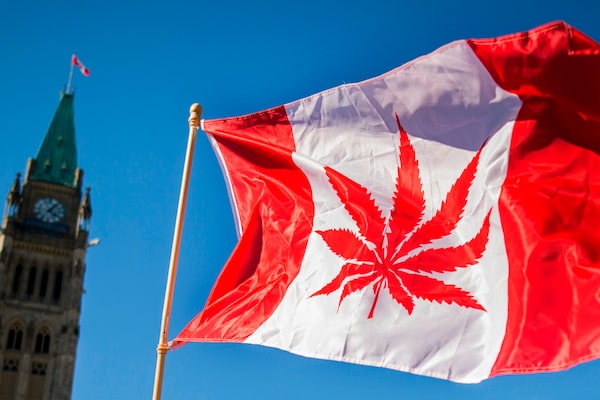
The sale of recreational Cannabis became legal Oct. 17.CHRIS ROUSSAKIS/AFP/Getty Images
Kira London-Nadeau is pretty chill about cannabis. A 23-year-old University of Toronto graduate who is now pursuing a master degree at Université de Montréal, she has seen nothing as an undergrad that makes her worry about the impact cannabis legalization will have on campus life.
"It was not seen as a big deal," she says of marijuana usage among university students.
Ms. London-Nadeau, who is also a Montreal-based national board member of the Canadian Students for Sensible Drug Policy (CSSDP), believes fears that cannabis usage will skyrocket this fall as Canada legalizes it are unfounded. She feels that students who want to smoke can always find a way to do so. "If you are on a university campus and you want cannabis, you can find cannabis," she says.
The sale of recreational cannabis became legal Oct. 17. The legal age of consumption ranges from 18 to 19, depending on the province. Legalization of edibles is to follow at a later date.
Research from the 2017 Canadian Cannabis Survey suggests that 41 per cent of Canadians between the ages of 16 and 24 used it in the past year.
But many, like Ms. London-Nadeau, believe that legalization will bring the advantage of increased cannabis regulation and monitoring.
Many universities across Canada have assembled working groups to develop policies around its usage and how to mitigate its potential harms. Many are employing tool kits like those developed by CSSDP, which ensure that students, their parents and educators can learn about types of cannabis, the effects they can cause and red flags that might indicate problem usage.
"Legalization is an opportunity for more open, better discussions [about cannabis] that may have been put on hold for a period of time," says Abby Goldstein, an associate professor at the University of Toronto and the Canada Research Chair in the Psychology of Emerging Adulthood. "My sense is that things are in the works and it will be an ongoing process."
The key, she says, "is how can we ensure we reduce the risk associated with use."
Dr. Goldstein says that, because cannabis has been around for a long time, universities are well-equipped to handle students grappling with addiction.
Many schools are also mulling over education campaigns to be targeted at students.
Heather D'Alessio, an executive board member at CSSDP, says some will bring awareness to the different types of marijuana consumption, such as smoking, vaping and edibles, and how each can deliver a different high. They will list the signs of potential addiction, such as missing classes, a lack of energy or sudden disinterest in social activities.
They might also address the apparent link between marijuana consumption and the onset of a mental-health issues, such as anxiety or depression in people with a family history of such disorders – and how to get help.
Legal issues might also be dealt with. “People think you can use it liberally,” says Ms. D’Alessio. “But you can’t share cannabis with a minor, for example. There are intricacies in the law.”
Finally, universities will determine whether to adapt their smoking policies to designate certain areas as cannabis smoking zones.
Mount Royal University in Calgary formed a working group months ago made up of students, staff and faculty, as well as legal and policy representatives, says Steve Fitterer, vice-president of student affairs and campus life.
The risks
Responsible-usage advocates such as Canadian Students for Sensible Drug Policy offer suggestions, including not mixing cannabis and alcohol, and seeking help if usage starts affecting personal or academic life.
Medical professionals are especially concerned about cannabis use among young people, as research suggests their mental and physical health is particularly vulnerable.
Since their brains are still developing, adolescents who use marijuana chronically may have memory, thinking and attention problems, according to the Canadian Centre on Substance Use and Addiction. Research also indicates a risk of respiratory conditions and possibly lung cancer, for adults as well as youth, it notes.
Marijuana use in adolescents is strongly linked to substance dependence and an increased presence of mental illness, including depression, anxiety and psychosis, according to the Canadian Paediatric Society. It can result in diminished school performance and lifetime achievement, the society notes.